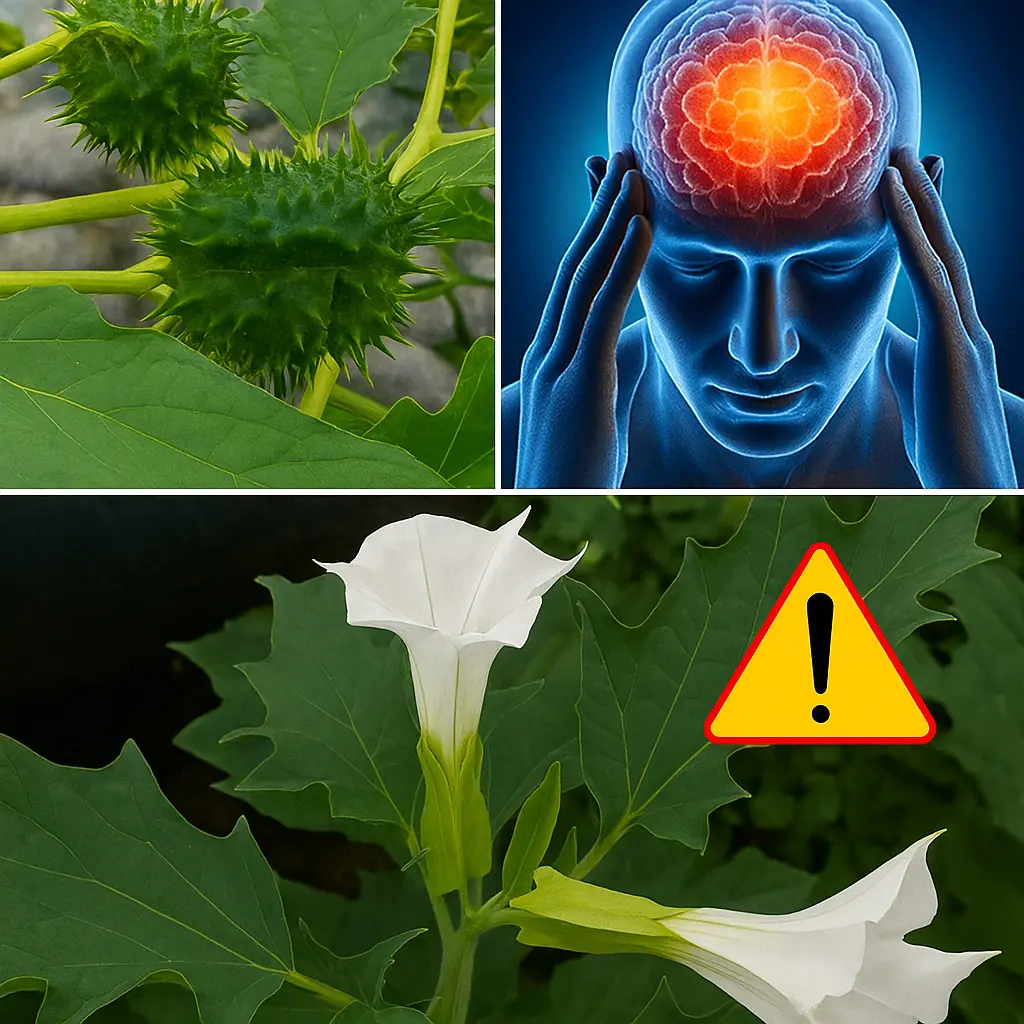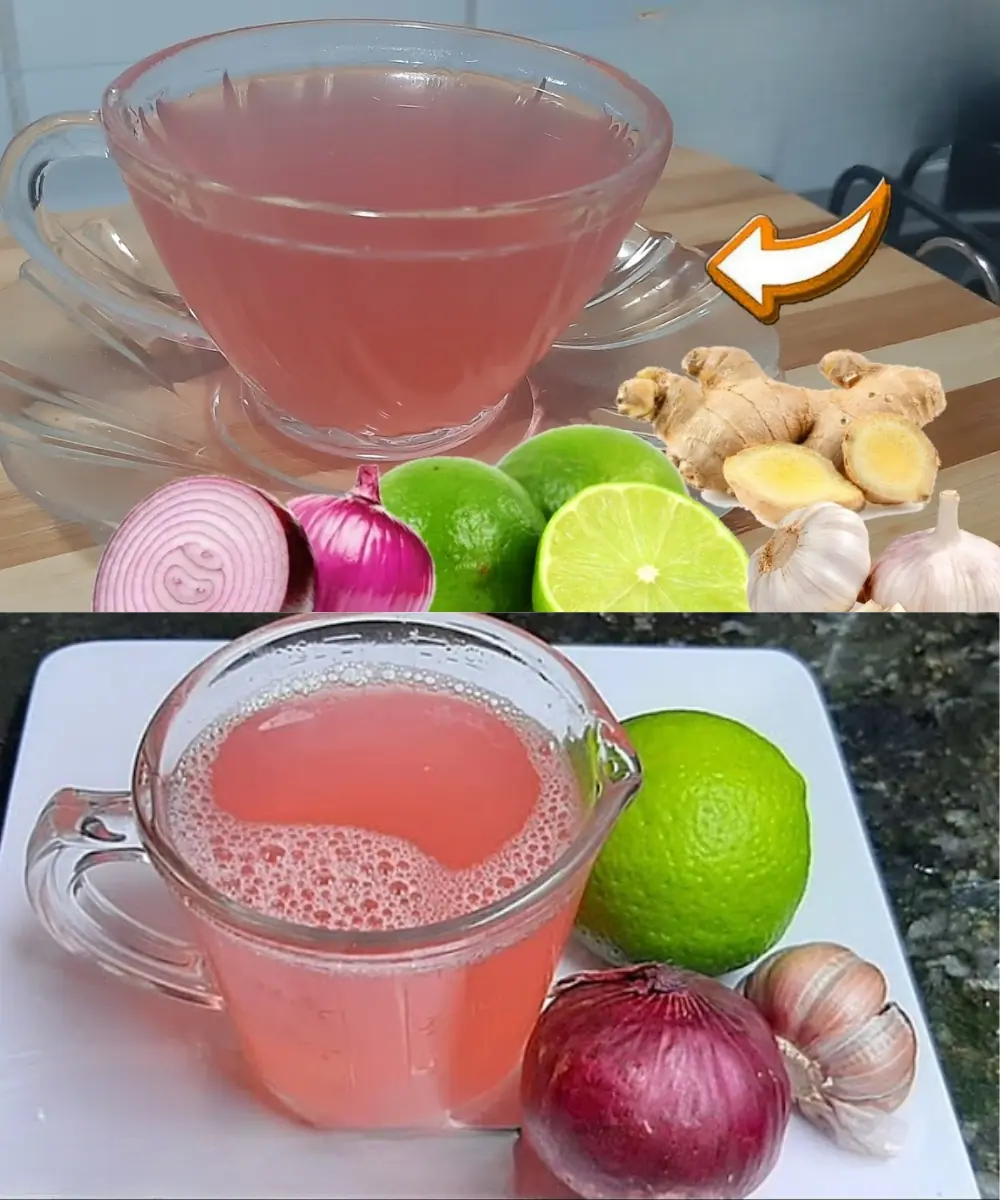
Healthy 2025-08-08 22:19:44
Datura Stramonium: The Deadly Allure of Nature’s Toxic Trumpet and Its Dark Medicinal Past

🌿 Imagine stumbling across a plant so beautiful it stops you in your tracks: delicate trumpet-shaped flowers in soft white or violet, swaying gently in a forgotten corner of your garden. Its spiky seed pods and jagged leaves seem to whisper secrets of the wild. This is Datura stramonium, a plant that captivates with its charm but hides a lethal secret. Known as jimsonweed or devil’s trumpet, it’s a member of the notorious nightshade family, and every part—leaves, flowers, seeds, and roots—carries a dangerous dose of toxins. Once used in ancient remedies for asthma and pain, this plant’s allure is matched only by its peril. Let’s uncover why Datura stramonium is both a natural wonder and a hidden threat, and how you can protect yourself while enjoying the beauty of nature.
The Seductive Beauty of a Dangerous Plant
🌸 Datura stramonium thrives in the wild, popping up along roadsides, in pastures, or even in your backyard. Its large, elegant flowers bloom in warm months, drawing the eye with their graceful shape and soft hues. For gardeners, foragers, or nature lovers, it’s easy to mistake this plant for an innocent ornamental or a folk remedy from days gone by. But don’t be fooled—its beauty is a trap. The plant’s toxic compounds make it one of the most dangerous flora in North America, capable of causing severe health issues, especially for older adults or those with medical conditions.
This plant’s deceptive charm lies in its duality. It’s part of the nightshade family, which includes familiar edibles like tomatoes and potatoes, but also deadly cousins like belladonna. Every inch of Datura stramonium is packed with potent chemicals that can wreak havoc on the human body. Its historical use as a medicinal plant—once brewed into teas for asthma or applied as a poultice for pain—only adds to its mystique, tempting the curious to explore its powers. Yet, without expert knowledge, any interaction with this plant is a gamble with serious consequences.
The Toxic Power Within: Tropane Alkaloids
⚠️ At the heart of Datura stramonium’s danger are its tropane alkaloids: atropine, scopolamine, and hyoscyamine. These chemicals disrupt the nervous system by blocking acetylcholine, a critical neurotransmitter that keeps your brain and muscles in sync. The result? A cascade of symptoms that range from uncomfortable to life-threatening. For seniors, who may already manage heart conditions or take multiple medications, even a small exposure can amplify risks.
A single seed, a nibble of a leaf, or even skin contact can trigger a reaction. The plant’s toxicity isn’t consistent—it varies with the season, soil, and climate, making it impossible to predict a “safe” dose. In the past, healers used tiny, precise amounts to treat ailments like asthma, harnessing scopolamine’s sedative effects. But without modern medical oversight, such uses are reckless. The line between remedy and poison is razor-thin, and crossing it can lead to disaster.
Recognizing the Signs of Poisoning
🚨 Exposure to Datura stramonium can spark symptoms within 30 to 60 minutes, and they may linger for up to two days. Knowing what to look for can save a life, especially for those who spend time outdoors. Here are the warning signs:
Dry mouth and intense thirst: The plant’s anticholinergic effects shut down saliva and sweat production, leaving you parched.
Dilated pupils and blurred vision: Your eyes may struggle to focus, with light sensitivity making things worse.
Rapid heartbeat: This can strain the heart, a serious concern for older adults.
Hallucinations and delirium: Vivid, often terrifying visions can lead to confusion or aggressive behavior.
Seizures or coma: In severe cases, the body shuts down, requiring urgent medical intervention.
For seniors, these symptoms can mimic other health issues, like dehydration or medication side effects, making misdiagnosis a risk. If you suspect exposure after handling an unknown plant, don’t wait—seek emergency help immediately. Time is critical when dealing with Datura’s toxins.
How You Might Encounter Datura Stramonium
🌱 This plant is more common than you might think, lurking in places where people, especially seniors, spend their time. It blends seamlessly into gardens, parks, or rural landscapes, often mistaken for a harmless weed or decorative plant. Here’s how you might cross paths with it:
Gardening mishaps: Datura stramonium can sprout in flower beds or vegetable patches, masquerading as a benign plant.
Foraging mistakes: Those seeking natural remedies might confuse it with edible or medicinal herbs, a dangerous error.
Accidental contact: Brushing against leaves or handling seeds can allow toxins to seep through skin, especially if you have cuts or touch your face.
Pets or grandchildren: Curious pets or young children may ingest the plant, putting everyone in the household at risk.
A chilling case involved a young child who suffered severe poisoning after eating Datura seeds, highlighting the plant’s threat to vulnerable groups. Seniors, with slower metabolisms or chronic conditions, face similar dangers, making awareness essential.
Historical Uses: A Risky Legacy
🩺 Datura stramonium’s toxic nature didn’t stop ancient healers from tapping its power. In small, controlled doses, it was used to ease asthma symptoms, reduce pain, or induce sedation. Scopolamine, one of its key alkaloids, was once a go-to for calming spasms or treating motion sickness. But these uses required deep expertise, as the plant’s unpredictable potency made overdoses common. Today, modern medicine has safer alternatives, rendering Datura’s medicinal use obsolete for the average person. Its historical allure only underscores the need for caution—yesterday’s remedy is today’s poison.
Five Practical Steps to Stay Safe
🛡️ You don’t have to abandon your love for gardening or nature to avoid Datura stramonium’s dangers. These five steps will keep you safe while you enjoy the outdoors:
Learn to identify it: Spot the plant by its trumpet-shaped flowers (white or purple), spiky seed pods, and jagged leaves. Use a plant identification app or consult a local expert if you’re unsure.
Wear protective gear: Always garden with gloves and long sleeves to shield your skin from unknown plants.
Supervise pets and kids: Keep them away from wild plants, especially in areas where Datura is common.
Skip wild foraging: Unless you’re a trained botanist, stick to store-bought herbs and avoid experimenting with wild plants.
Remove it safely: If you find Datura in your yard, use gloves and tools to dig it out, bag it, and dispose of it properly—never burn it, as the smoke can be toxic.
These simple habits let you embrace nature’s beauty without risking your health.
What to Do in Case of Exposure
🚑 If you or someone else might have been exposed to Datura stramonium, act fast. Here’s what to do:
Call for help: Dial 911 or Poison Control at 1-800-222-1222 and describe the plant and symptoms.
Don’t induce vomiting: This can worsen the situation, especially for those with heart or breathing issues.
Seek medical care: Treatments like activated charcoal or, in severe cases, physostigmine can counteract toxins, but only a doctor can provide them.
Bring a sample: If it’s safe, collect a piece of the plant (with gloves) to help doctors confirm the diagnosis.
Quick action can prevent serious outcomes. Thousands of Datura poisoning cases are treated each year, and early intervention often makes the difference.
Safe Gardening for a Vibrant Life
🌻 Gardening and nature are gifts, especially for seniors looking to stay active and reduce stress. By understanding Datura stramonium’s risks, you can keep your outdoor passions thriving safely. Opt for non-toxic plants like marigolds, lavender, or sunflowers, which bring color and joy without danger. Local gardening clubs or extension services can guide you toward safe plants for your region, ensuring your garden is a haven, not a hazard.
Staying curious about the natural world is a beautiful part of life, but caution is your best companion. Share this knowledge with fellow gardeners, friends, or family to keep everyone safe. Let’s nurture our love for nature while respecting its power.
A Final Word of Caution and Curiosity
🌟 Datura stramonium is a paradox: a plant of breathtaking beauty with a deadly edge. Its historical role in medicine adds intrigue, but its dangers demand respect. By learning to recognize it, taking precautions, and acting swiftly in emergencies, you can enjoy nature’s wonders without fear. Keep exploring, keep gardening, and keep safety first. What’s your favorite way to stay safe in the garden? Let’s share tips to make every outdoor moment a joy.
News in the same category


Don’t Drink Coconut Water Before You Know These 11 Secrets!

Pumpkin Seed Milk — The Natural Parasite Cleanser

Fast Rice Water Trick for a Brighter Smile

Morning Drink to Revive Your Kidneys Fast

The Onion Recipe That Could Transform Your Blood Sugar, Support Cleaner Arteries, and Protect Your Heart!

Top 4 Fruits That Help Your Kidneys Flush Out Toxins While You Sleep

Ginger, Clove, and Honey: The Natural Trio Your Body Will Thank You For

Heal 15 Years of Joint Pain Naturally with Turmeric and Honey Tea

This Juice Revived My Grandma’s Energy — Say Goodbye to Fatigue and Body Pain with This Natural Recipe

I’m 66 but Look 36 — My Secret? Aloe Vera & Ginger for Firm, Smooth Skin

How to Make Okra Water to Treat 17 Health Problems Naturally

Banana and Egg Mask to Look Younger Even in Your 80s

Scent Leaf Secrets Unveiled: 10 Surprising Health Benefits of This Miracle Herb

From White Hair to Black Hair Naturally in Just 5 Minutes — Fast Hair Growth Remedy

Boost Your Immune System Year-Round with Garlic, Onion, and Lemon

When You Start Eating 2 Eggs Every Day, Here’s What Happens to Your Body (Is It BAD??)

13 Warning Signs Your Kidneys Are Failing – Don’t Ignore These Symptoms

Save Your Heart: 8 Foods to Naturally Lower Cholesterol

Silent Signs of Artery Blockages Seniors Can’t Ignore
News Post

WHAT HAPPENS WHEN WE TONGUE KISS…See more
Fitness 30/10/2025 13:23

Nature’s Secret: 4 Healing Leaves That Support Metabolism, Immunity & Circulation Naturally
Healthy 27/10/2025 19:23

Don’t Drink Coconut Water Before You Know These 11 Secrets!
Healthy 27/10/2025 19:21

Pumpkin Seed Milk — The Natural Parasite Cleanser
Healthy 27/10/2025 19:19

Fast Rice Water Trick for a Brighter Smile
Healthy 26/10/2025 22:42

Morning Drink to Revive Your Kidneys Fast
Healthy 26/10/2025 22:38

The Onion Recipe That Could Transform Your Blood Sugar, Support Cleaner Arteries, and Protect Your Heart!
Healthy 26/10/2025 22:37

Top 4 Fruits That Help Your Kidneys Flush Out Toxins While You Sleep
Healthy 26/10/2025 22:35

Ginger, Clove, and Honey: The Natural Trio Your Body Will Thank You For
Healthy 26/10/2025 19:06

Heal 15 Years of Joint Pain Naturally with Turmeric and Honey Tea
Healthy 26/10/2025 19:04

This Juice Revived My Grandma’s Energy — Say Goodbye to Fatigue and Body Pain with This Natural Recipe
Healthy 26/10/2025 19:02

The Benefits of Eating 2 Boiled Eggs Every Morning: Transform Your Health!
Health News 26/10/2025 01:57

If Your Kidneys Are in Danger, Your Body Will Send You These 8 Signals — Don’t Ignore Them
Health News 26/10/2025 01:54

The Surprising Effects of Avocado on Your Heart and Brain
Health News 26/10/2025 01:44

Ways to Get Over a Man Who Didn’t Value You
Fun Fact 26/10/2025 01:36

I’m 66 but Look 36 — My Secret? Aloe Vera & Ginger for Firm, Smooth Skin
Healthy 25/10/2025 19:44

How to Make Okra Water to Treat 17 Health Problems Naturally
Healthy 25/10/2025 19:42

Banana and Egg Mask to Look Younger Even in Your 80s
Healthy 25/10/2025 19:29

Scent Leaf Secrets Unveiled: 10 Surprising Health Benefits of This Miracle Herb
Healthy 25/10/2025 19:24

From White Hair to Black Hair Naturally in Just 5 Minutes — Fast Hair Growth Remedy
Healthy 25/10/2025 19:22